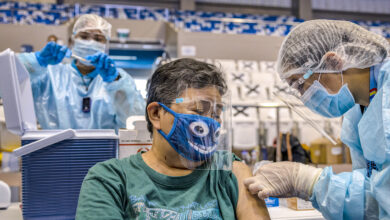By Lee Eric Smith, New Tri-State Defender
Marketia Morrow is quietly terrified.

As the Chief Nursing Officer at Alliance Healthcare System in my hometown of Holly Springs, Miss., she is in a combat zone – she can’t self-isolate. Can’t keep a six-foot distance. Can’t work from home. She faces the enemy – COVID-19 – every day, averaging 50-60 hours a week since the pandemic began. She fears that she – and by extension, her family – are being silently attacked, though she might not know for days.
She did not sign up for this.
“I signed up to be a nurse to provide care to patients, not necessarily thinking we would ever be in such a high-risk situation,” she told me Tuesday. “I was talking to (Alliance owner) Dr. (Kenneth) Williams about how everything had changed. He made the statement that nothing is normal. And when I got off the phone, I thought about it.
“Nothing is normal,” she added. “Everything has changed.”

As of March 31, the Mississippi State Department of Health’s website was reporting 1,073 total cases statewide and 22 fatalities. Marshall County, where Holly Springs is, had reported 15 cases and no deaths, so far.
Hospitals are slammed because of coronavirus – no surprise there. We see it play out in cities such as New York, Chicago and Los Angeles every day. Local Memphis news teams are doing phenomenal work informing and educating Memphis and beyond.
But all across America, there are thousands of small towns like Holly Springs fighting this virus without cameras rolling – also without essential equipment, staff or training. Town leaders are improvising on the fly, even as the landscape is shifting underneath their feet.

“With all of the hospitals and medical facilities Memphis has, they have a clear advantage in their healthcare facilities and access to different kinds of needs relating to treating this pandemic,” said Holly Springs Mayor Kelvin Buck. “With that said, we were able to get online with some of those things pretty quickly.”
Many of the challenges facing Holly Springs are the same ones facing Memphis – how do you keep people from gathering in public? What about educating children while school is out? How will people deal with job disruptions and layoffs? Buck said that for the most part, citizens are complying with stay-at-home orders and social distancing.
But he envied how quickly Shelby County Schools was able to quickly ramp up “School on TV” with WMC-TV 5 and other accommodations. The Holly Springs School District wasn’t set up at all for remote learning.
“It took us a while to get caught up with laptops for the students,” he said. “So many kids didn’t have computers and a lot don’t have the Internet.”
And then, there’s church.
“One of the biggest challenges has been there were a couple of churches that didn’t want to comply,” Buck said. “And they were using arguments of constitutional rights and freedom of religion and stuff like that.”
He wouldn’t name the churches. “I’m trying to keep them out of the public because one of them has said they’ll try to be back next Sunday,” he said. “We’ll see.”

Back at Alliance, Morrow is facing the same shortages that other providers are: specifically PPE’s – personal protective equipment. Ordinarily, such equipment would be thrown into the red biological waste container, never to be used again, she said. But the supplies just won’t allow that.
“Once you go in that room (wearing protective gear), it’s infected. It’s contaminated,” she said, referring to non-pandemic procedures. “And it goes in the garbage can. We don’t reuse anything. But as far as face shields are concerned, we have to (reuse them) because we don’t have any more.”
And then there’s the fact that Alliance has no intensive care unit. The hospital can handle a few cases of respiratory illness, but when the onslaught hits, patients will be referred to larger hospitals in places such as Memphis, Olive Branch, Southaven, Oxford or even Tupelo, Morrow said. And all of that was before The White House projected “a painful couple of weeks.”
Morrow has the curse of knowing too much. Used to be when she got home, her kids rushed outside to give her big hugs and kisses. But not anymore. She takes off her clothes before entering the house, goes straight upstairs for a shower. The clothes are immediately washed. And then, hugs . . . maybe.
“The nurse in me is still worried when I go home to provide care for them,” she said, her voice cracking. “Breathing in front of them. Talking to them.
“Now that it’s everywhere, all over your workplace and you’re having to go home and you don’t want to expose your family to it because they didn’t sign up for it. You did,” she added. “It makes you think . . . a lot. I signed up to be a nurse, but I didn’t really expect all this. But one day at a time, you push through. As many prayers as possible.”
Like a good reporter, I ask her a question I already know the answer to: With so much personal risk – to herself, to her family – what makes her keep coming back?
“I’ve never given up easily,” she replied. “I feel like, if I don’t, who will? You never know, I may need somebody to provide care for me. . . . I don’t know what makes me keep coming back. I just feel like it’s my responsibility. I do all I can to protect myself while I do it and I just keep coming.
“Honestly, I can’t give you a direct answer,” she sighed.
Like I said, I knew the answer before I asked. So I told her.
“I know why you come back,” I said. “Because you’re a freaking SUPERHERO, that’s why. You run into the burning building so you can save lives. That’s what superheroes do.”
Which is why I smiled when she sent me pictures of her and her team at work – in nurse gear, head coverings . . . and face masks. Of course.
Just like superheroes.
(Lee Eric Smith is an NNPA award-winning columnist and co-founder of Abundant Earth Global CDC, a nonprofit aimed at blending eco-friendly home construction, urban farming and waste-to-energy production to regenerate neighborhoods. Follow him on Twitter and Instagram: @l3esmith.)
She faces the enemy – COVID-19 – every day, averaging 50-60 hours a week since […] This article originally appeared in the New Tri-State Defender




